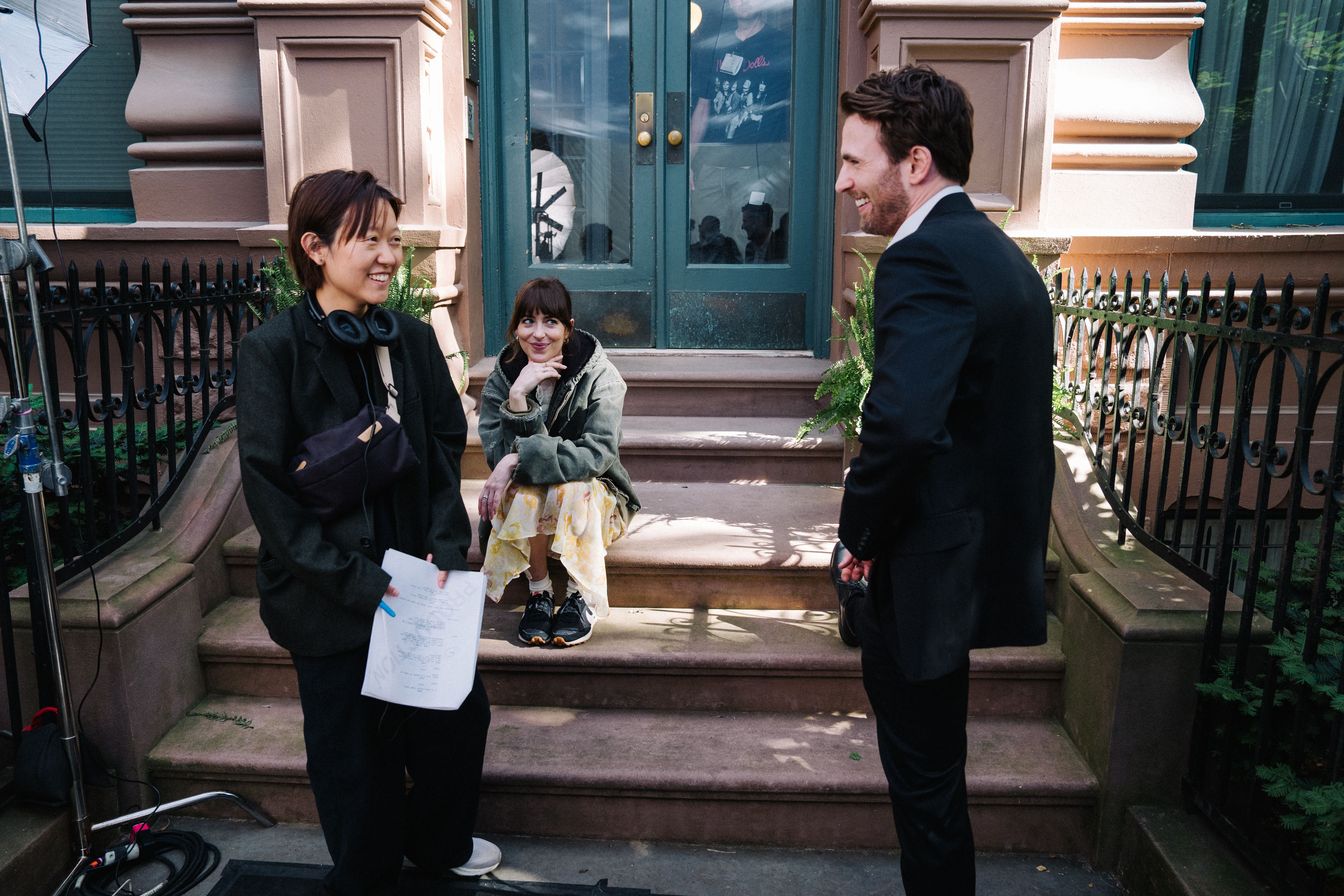The Monday morning I sat down with Celine Song in New York City, where she lives and where her hotly awaited new film “Materialists” is set, came about an hour after reviews broke. Led by an appealing cast and doubling as a breezy romance and an incisive critique of modern dating, “Materialists” is her second movie as a director, and her first since “Past Lives” turned Song into the Oscar-nominated belle of the 2023-2024 awards season.
Reactions pouring in were going well, as most reviews (including IndieWire’s) reacted positively to writer/director Song’s portrait of matchmaker-to-the-moneyed Lucy (Dakota Johnson), who balances the clinical outlook on romance her job demands with an unexpected love triangle between herself, a lethally charming private-equity broker and potential client named Harry (Pedro Pascal), and her less-polished, struggling-actor ex John (Chris Evans). But Song, she said, doesn’t read reviews. She leaves that task to her husband, “Challengers” and “Queer” screenwriter Justin Kuritzkes, to deliver the highlights.
“We do this for each other. Just because [reading reviews] sort of distances the movie, too,” Song told IndieWire. “The thing that you made is this thing that is, in a way, totally intangible. To see it in paper adjudicated and judged, even if it’s so positive and wonderful, which is true, too, still, it’s turned into words where it’s being evaluated. There is a bit of it where it feels sad, you know? Even if it’s good. I love hearing that it’s good. I love it when he reads me snippets, like, ‘OK, this is good,’ but it’s nothing to do [with] the movie anymore.” She laughed, “It’s no longer mine!”
Song’s latest movie takes the shape of the classic ’90s rom-coms (think Nora Ephron) or rom-drams (think James L. Brooks) nobody makes for theaters anymore, but it has more on its mind, and is perhaps more cannily sociological than its predecessors. For one, Lucy lives in debt and out of her means on an $80,000 annual salary (which, a sad reality, for a single New Yorker living on their own in a studio or a one-bedroom as she does is at the low end of livable). For another, her clients, including Sophie (Zoë Winters), come to her frayed by the dating market, likely arriving at the matchmaking service Adore (run by Marin Ireland’s character) after striking out once again on the apps.
Song’s breakout “Past Lives” — a ruminative, what-might-have-been walk-and-talk about a married Korean-American immigrant (Greta Lee) who reconnects with her childhood best friend and potential lost flame (Teo Yoo), premiered at Sundance 2023. Ecstatic acclaim and awards ambitions from A24 suddenly flung the first-time feature filmmaker (who got her creative start in the New York theater world after moving to Canada from Korea with her family when she was 12) onto the long-haul festival and awards circuit, which demands a lot from anyone. It would be more than a year until she finally attended the 2024 Oscars, where “Past Lives” was nominated for Best Picture, but in between, she attended innumerable fests and awards ceremonies to represent her critical darling.
“I can imagine, in 10 years, I’ll be like, ‘I can’t do that!’” Song laughed. “But the first movie, I felt like I could do it, and I liked getting to know different festivals and different sides of the release internationally. How’s it doing in Spain? Again, the topic was love, which I could talk about forever. It wasn’t like I was talking about something difficult.”
Journalists speculated as to why A24 opted to skip festivals and take “Materialists,” which wrapped in New York in Spring 2024, directly to theaters for a wide release this summer. It’s opening on June 13 in around 2,800 theaters; “Past Lives” started in four theaters with a platform release two years ago, playing eventually at most in just over 900 to gross $11 million by the end of a nine-month run. (The fizzy rom-com-centered marketing on “Materialists,” meanwhile, may turn out to be a bait-and-switch for what is a deeper drama in the end, but early social sentiment was high even before reviews.)

“They’re a studio. They’re the ones who tell me what they think. But they do care, more than the other studios, about [creativity] and what the filmmaker wants. When they were talking about me — ‘this is the plan’ — I got really excited. I was like, really? You think? That’s so cool,” Song said. “I wanted an amazing experience like that, because I had an amazing, beautiful experience releasing ‘Past Lives’ … With this movie, I’m trying to do something different. Similarly, I want to have a different experience releasing the movie.”
As for the films and literature that inspired “Materialists” — which is so much caught up in the mathematics of love, its operations and behavior as an economically driven apparatus grounded in value, mutual exchange, and investment — it was Brooks, Ephron, even Billy Wilder. “There was a whole era where you just get to show up to a movie where people are going through things, and there’s so much romance, and it’s going to be about love because it’s the thing we are all interested in. It’s also about the way life works.”
But Jane Austen, ever the literary master of tracing how romance also is and must be a kind of business deal pivoted around a woman’s life station, also spoke to Song (whose academic studies have included psychology, philosophy, and playwriting) and “Materialists.” “Victorian romances are really in touch with the material reality and the pressures of marriage, the pressures of partnering, especially for women whose only way at the time to have any power or security or prosperity was through marriage,” she said. “In 2025, women can have jobs, they can have lucrative salaries, an amazing career, but amazingly, there’s still material pressures of partnership that still pervade differently.”
Women, she said, like Lucy, who is “not somebody who was born rich and feels like she has to fit into the wealthy world that allows her to do the work that she does. She’s always going to live a little bit beyond her means, which is quite relatable for New Yorkers: You set a budget for rent, and then you end up paying $500 more,” Song said. Lucy, though, because of her job duties and past disappointments in love, can only at first see romance and marriage in terms of numbers, which is why when she meets Harry at a client’s glitzy wedding, she grills him about his income, his height, and his background without even attempting to interrogate his essence as a person, his interests beyond the status signifiers that could make him a suitable match.
As “Materialists” is a love story about singles navigating New York City, of course, “Sex and the City” and its own Austenian contemplations of the metrics of dating life and how wealth and privilege play a factor in courtship, come to mind not just among the audience but for Song, too.

“The thing about ‘Sex and the City’ is that now, sometimes you rewatch it, and you’re like, ‘Those are some old ideas about gender!’” laughed Song, who like any romantic New Yorker or even aspiring ones raised herself artistically on the show to a degree, too. “But some of those things you realize, you grew up imagining what it is like to live in an unconventional way as a working woman. It’s one of the longest-lasting [stories about] being a woman and also being a woman who is not necessarily likeable 100 percent of the time. There’s some element where it was always completely relatable, and then you also fall in love with New York City through that show. You get to know everything about where you want to go. They’ll be like, ‘In downtown…,’ and we’ll be like, ‘Ooh, downtown!’ And I’ll be watching from Toronto.”
“Sex and the City,” which Song praised as never “moralizing,” is about a fantasy of New York City, a fantasy of being a single person, and the kind of fantasy Song both tributes and even debunks in “Materialists.” Her film, though, takes us to parts of New York we didn’t see in the HBO series or even now on its HBO Max counterpart “And Just Like That” or rarely in Manhattan love stories, like Brooklyn’s Bushwick, where John stars in a new play (“Tom and Eliza,” named for Song’s own 2016 prize-winning stage work), or the bayside Sunset Park, where he lives in a cramped three-bedroom with two chaotic roommates.
“When I scripted it in 2022, I thought he would be living in Bushwick, and then, me and my location manager realized that Bushwick has been so far gentrified that it just wouldn’t make any sense,” she said. “It would be too expensive for him. I don’t give a fuck about this New York real estate. But that’s why we were like, what’s a place that’s not fully gentrified, where as an actor you have two roommates and pay that much, and are in a sweet situation and can’t move and the apartment’s shitty?”
Song may not give a fuck about New York real estate, but her movie is as interested in the balance sheets endemic to human romances as it is the emotions needed to sustain them at all.
“Have you become so completely wrapped up in the numbers and the algorithm and the way that we objectify and commodify ourselves that that’s what we’re considering more real than true love?” Song wondered, pondering her movie’s true theme. “The character Sophie says, ‘I’m not merchandise. I’m a person.’ What does it mean to be a person right now? Is it actually the way it seems on Instagram? ‘Materialists’ is really interested in the dating market. That’s the job Lucy has, that’s where the cynicism is from. The dating market existed in Victorian romances — it was kind of local, the garden parties, the actual gossip. Now, the marriage market is on their phones. You can go to Instagram and compare your own value as a data point … in comparison to everyone else.”
She continued, “There is an endless self-commodification and self-objectification. All the language we have around self-improvement, for example. Like, ‘Everybody’s getting Botox. Why don’t you get Botox? Do you not want to invest in your face?’ They talk about it as an investment. ‘You’re going to look so much better. You’re going to be improved.’ There’s a very insidious conversation about improving your value … at the end of the day, what you’re trying to say is that you’re merchandise, you’re for sale, so you should improve your value, just like how you improve anything you’re trying to sell. Everything comes down to Sophie’s line: ‘I’m not merchandise. I’m a person.’ It’s fun to play the game and objectify ourselves and each other. It’s catty. But the end of that is going to be dehumanization.”
“Materialists” opens in theaters from A24 on Friday, June 13.



